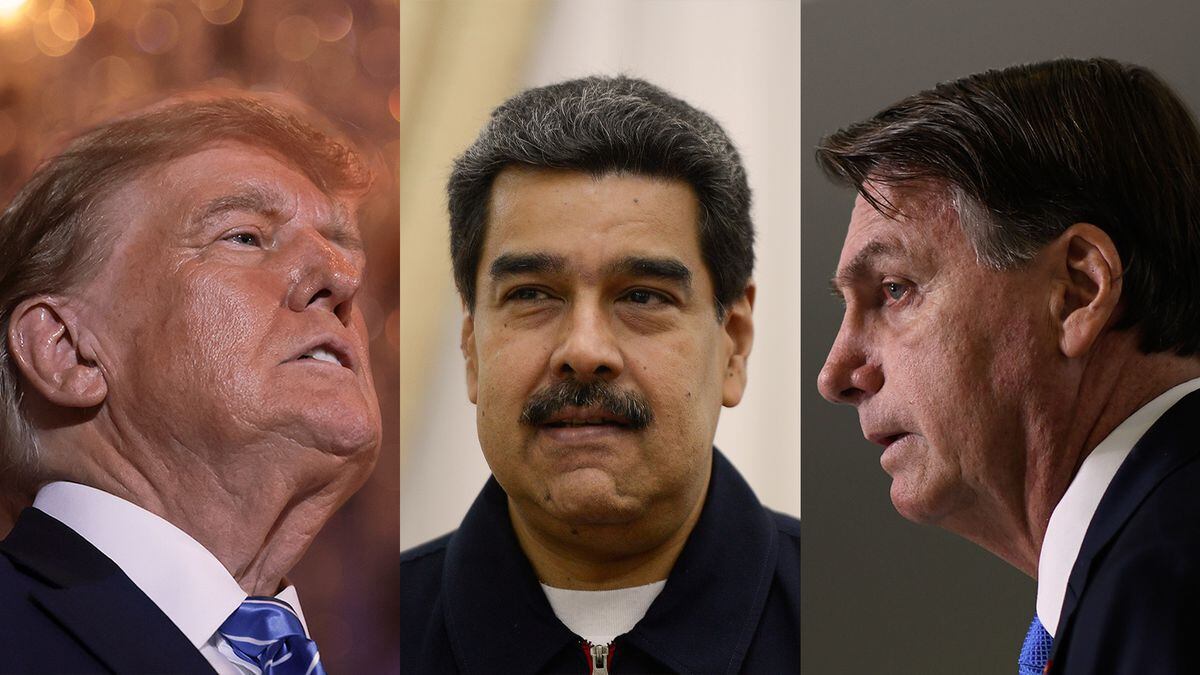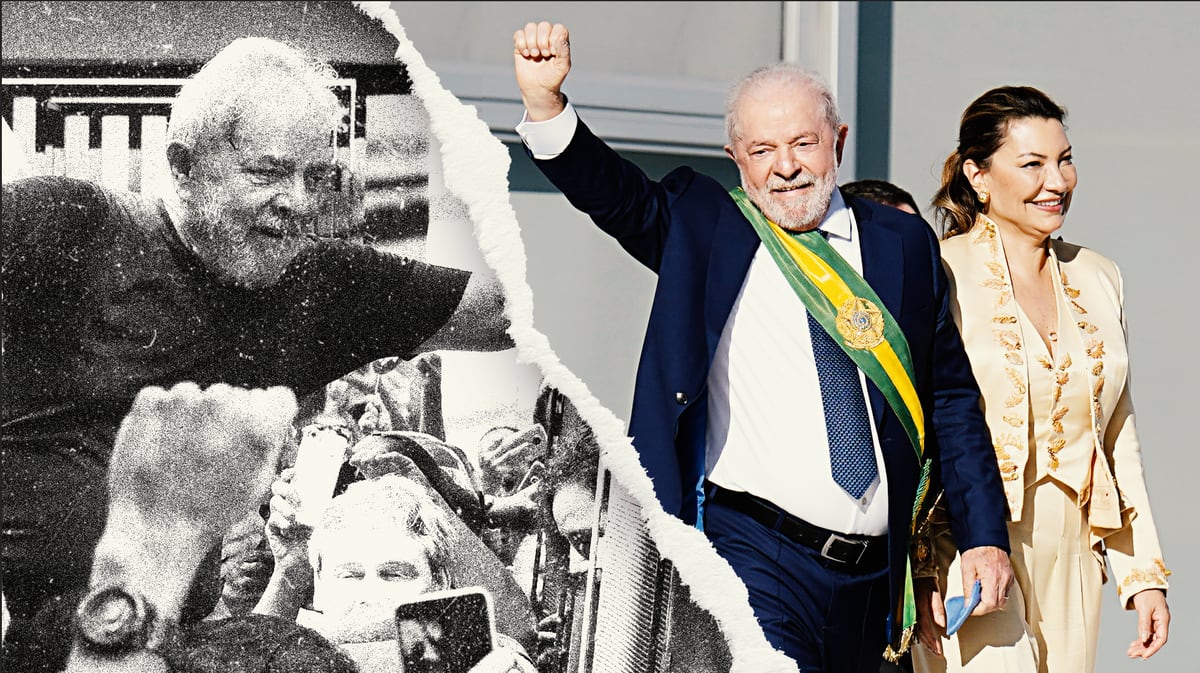Donald Trump is not the only right-wing populist who has an aggressive style of government - and is surprisingly popular with women.
Right-wing populists have
celebrated electoral successes around the world in recent years - despite questionable attitudes towards women.
Politicians like
Donald Trump
and
Jair Bolsonaro
also enjoy great support from the female electorate.
In this analysis, the journalist Jill Langlois works out the background to the phenomenon.
This article is available in
German
for the first time
- it was first published on December 1st by the magazine
Foreign Policy
.
Miriam Goulart was upset when President
Donald Trump
lost the election.
The 45-year-old Brazilian mother of three had her fingers crossed for Trump - whom she describes as "persistent" and as someone who wants "the best for his country".
He reminds her of the president of her own country:
Jair Bolsonaro
, another brash fellow who
rode to power
on a
wave of populist anger
and sparked controversy with his public statements about women.
Bolsonaro once said to a female congresswoman that he would not rape her because she "didn't deserve".
Trump, Bolsonaro, Duterte, Duda: “Macho populism” is winning voters around the world
This rhetoric has deterred neither Goulart nor that leaders such as Trump and Bolsonaro the million other women around the world despite their
misogyny
worship.
Trump was not re-elected, but received more votes from women in 2020 than four years earlier.
Even if Trump's defeat
may have put a damper on
his
“macho populism”
brand
, global leaders like Bolsonaro,
Philippine President Rodrigo Duterte
and
Polish President Andrzej Duda
continue to
enjoy
strong support from many women, suggesting that they do Phenomenon won't go away anytime soon.
And in many cases, it's women who give it a boost.
While there is no single explanation for why women in different countries support macho populists - that is, politicians who
embody
an
ideal of male dominance
- there are some similarities.
Women tend to be more religious than men;
a fact that macho populists often use to their advantage.
Trump has campaigned aggressively for religious voters, and three-quarters of
white evangelicals
voted for him in 2020.
There is a similar dynamic in Brazil and Poland, drawing women towards men who appear to conform to traditional gender norms.
Populists with a focus on the “nuclear family”: Bolsonaro speaks to believers and women
When Ellen Nunes, 29, pondered who to
vote
for in the
2018 Brazilian presidential election
, everything she wanted was in Bolsonaro, a former military captain who had promised to restore Christian ideals - in a country where 81 percent of the population are
Catholics
or
Evangelicals
.
“He speaks of principles based on the nuclear family.
That is exactly what we need at home, ”says Nunes.
She grew up in a family where “men were men and women were women” and she has no problem with “what many other people see as sexism or authoritarianism on the part of the president”.
Claudia Félix, also Brazilian, 49 years old, married,
mother of
two
, is just as carefree.
“Men typically react differently than women,” says Félix.
"They are more direct, especially if they were in the military like him."
Macho populists: "Messiah", hard line of abortion and the fight against drugs and crime
In public appearances, Bolsonaro often uses his middle name,
Messiah,
and thus rhetorically equates himself with Christ the Redeemer.
He has told his supporters that he was chosen to deliver the Brazilian people from the chaos caused by corruption, violence, the radical left and
feminism
.
"Bolsonaro's supporters act as if they were his disciples," said Daniela Gomes of McGill University, Canada, currently visiting professor of international studies at
Trinity College in Hartford
, Connecticut.
"They worship him no matter what he does."
+
Jair Bolsonaro and Donald Trump at their meeting in March 2020
© Alan Santos / President Brazil / www.imago-images.de
In Poland, Andrzej Duda, a president who was narrowly ahead of the re-election this summer, described
LGBTQ rights
as an “ideology” that is more destructive than communism.
A few months later, he praised a
court ruling
in which
abortions
due to abnormalities in fetuses - were declared unconstitutional - which account for most carried out in the country abortions.
(After nationwide protests, he rowed back a little.)
Another point: women supporters of macho populism often share the desire for a hard line in the
fight against crime
.
In the Philippines, Duterte stylized himself as the protector of women, many of whom believe he contributed to their safety.
The president
waged
a
violent war on drugs
that left more than 8,600 dead.
Last year he signed a law criminalizing public sexual harassment.
Trump or Duterte: Assaults on women and negative political effects apparently do not bother female voters
For many of his supporters, these measures mask Duterte's countless statements in which he
appears to promote
sexual violence
, for example when he attributed an increase in rape cases in his hometown to the fact that there are "many beautiful women" there.
He has admitted sexually molesting a housemaid as a teenager and instructed Filipino soldiers to shoot female rebels in the genitals, saying, "Without a vagina, they're useless." Duterte insists these are jokes, and many Filipino ones Women believe him.
When he forcibly kissed a migrant woman at an event in South Korea, many Filipinas did not see this as an assault, but as a sign of closeness.
“It is felt as: 'He is one of us.
He doesn't find us repulsive, '”explains Sharmila Parmanand, who
has a PhD in gender studies from
Cambridge University
.
But macho-populist rhetoric, in which
women are
often
fetishized
as
chaste and vulnerable
, is in part at odds with the actual effects of politics.
Duterte's drug war has left a number of women more economically and physically vulnerable.
Trump's expansion of the
Mexico City Policy
[a policy that removes all US funding from organizations providing abortion-related services]
has dramatically cut
funding for
reproductive health services
in the United States and around the world.
Bolsonaro has cut Brazil's long-running social assistance program Bolsa Família, which finances support for 13 million families living in poverty and extreme poverty - most of them run by single mothers.
In
Vladimir Putin's Russia
, some forms of domestic violence have been decriminalized.
And under Indian Prime Minister
Narendra Modi
, sexual violence against women has increased despite his promise of a “zero tolerance policy”.
Machos in power: women are not always the better alternative either - and why white women voted Trump
More women in positions of power are not necessarily the solution either.
The newly elected US Congressman Marjorie Taylor Greene, the French politician
Marine Le Pen
, the Brazilian politician
Joice Hasselmann
and other female public figures have adopted
tough, anti-feminist policies
.
“The male populist charisma appeals to both men and women,” says Susi Meret, Associate Professor of Politics and Society at Aalborg University in Denmark.
In the USA, this stimulus is much stronger for
white women
: 55 percent of them voted for Trump (two percentage points more than 2016).
Both black and Hispanic women overwhelmingly voted for
Joe Biden
- but Trump received a higher percentage of the vote from them in 2020 than in 2016. “Some women see what is happening on the [Mexico] border with sterilization [ migrant women are said to have been sterilized there without their knowledge] or whatever happens to communities of colored people has no relation to their own lives, ”explains Christina M. Greer, Associate Professor of Political Science and American Studies at Fordham University.
"We all have multiple identities, and I think a lot of white women have
chosen a
color identity rather than a gender
."
Trump and Bolsonaro: fragile friendship among politicians of the same type
Trump's defeat may not mean the end of macho populism, but it could weaken the coalition of like-minded leaders that has emerged in recent years.
Macho populists have made no secret of their affection for one another.
China's President Xi Jinping
has called Putin his "best and best friend".
Bolsonaro has repeatedly praised Trump and
even said "I love you" to him
at a meeting of
the United Nations General Assembly
last year.
But
he suffered heavy losses
in the recent
local elections in Brazil
.
Seventy-eight local candidates had “Bolsonaro” written next to their names - candidates are allowed to add nicknames to the ballot papers - as an expression of their loyalty to the incumbent president.
Only one of them was elected.
Bolsonaro now appears to be distancing himself from the outgoing US president;
He reportedly said after Trump's defeat that he was "not the most important person in the world".
Bolsonaro suffers weakness in local elections - voter remains calm: "How could you not love this president"
Goulart sees Bolsonaro's lack of support in the local elections not as a loss, but as a step towards change.
And she is sure that he will win again in 2022.
“It's only been two years since people woke up,” she says.
“Not everything will change in four years, in just one term.” Goulart still believes that Bolsonaro's
military toughness is
exactly what Brazil needs.
“Look what he's already done to the population,” she says.
“He made everyone think.
That’s spectacular.
How could you not love this president? "
by Jill Langlois
Jill Langlois
is a freelance journalist based in São Paulo, Brazil.
She writes for the
New York Times
,
Fortune
and
USA Today
, among others
.
This article was first published in English on December 1, 2020 in the magazine “ForeignPolicy.com” - as part of a cooperation, the translation is now also available to
Merkur.de
readers
.
+
Foreign Policy Logo
© ForeignPolicy.com









